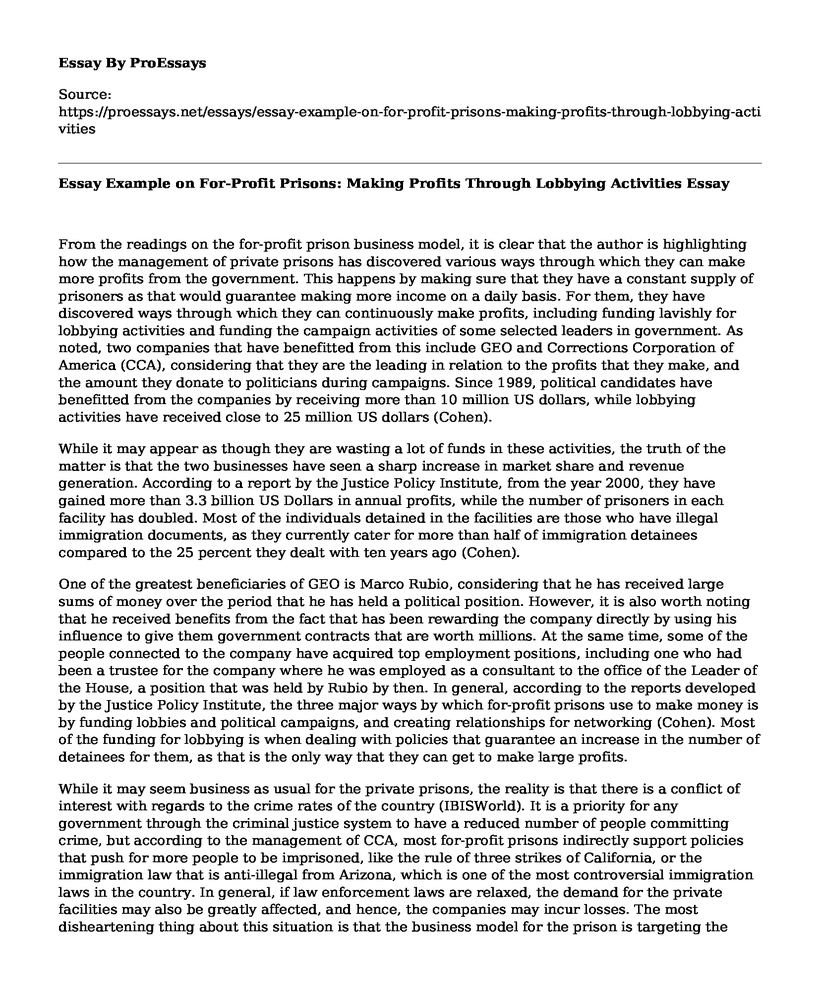From the readings on the for-profit prison business model, it is clear that the author is highlighting how the management of private prisons has discovered various ways through which they can make more profits from the government. This happens by making sure that they have a constant supply of prisoners as that would guarantee making more income on a daily basis. For them, they have discovered ways through which they can continuously make profits, including funding lavishly for lobbying activities and funding the campaign activities of some selected leaders in government. As noted, two companies that have benefitted from this include GEO and Corrections Corporation of America (CCA), considering that they are the leading in relation to the profits that they make, and the amount they donate to politicians during campaigns. Since 1989, political candidates have benefitted from the companies by receiving more than 10 million US dollars, while lobbying activities have received close to 25 million US dollars (Cohen).
While it may appear as though they are wasting a lot of funds in these activities, the truth of the matter is that the two businesses have seen a sharp increase in market share and revenue generation. According to a report by the Justice Policy Institute, from the year 2000, they have gained more than 3.3 billion US Dollars in annual profits, while the number of prisoners in each facility has doubled. Most of the individuals detained in the facilities are those who have illegal immigration documents, as they currently cater for more than half of immigration detainees compared to the 25 percent they dealt with ten years ago (Cohen).
One of the greatest beneficiaries of GEO is Marco Rubio, considering that he has received large sums of money over the period that he has held a political position. However, it is also worth noting that he received benefits from the fact that has been rewarding the company directly by using his influence to give them government contracts that are worth millions. At the same time, some of the people connected to the company have acquired top employment positions, including one who had been a trustee for the company where he was employed as a consultant to the office of the Leader of the House, a position that was held by Rubio by then. In general, according to the reports developed by the Justice Policy Institute, the three major ways by which for-profit prisons use to make money is by funding lobbies and political campaigns, and creating relationships for networking (Cohen). Most of the funding for lobbying is when dealing with policies that guarantee an increase in the number of detainees for them, as that is the only way that they can get to make large profits.
While it may seem business as usual for the private prisons, the reality is that there is a conflict of interest with regards to the crime rates of the country (IBISWorld). It is a priority for any government through the criminal justice system to have a reduced number of people committing crime, but according to the management of CCA, most for-profit prisons indirectly support policies that push for more people to be imprisoned, like the rule of three strikes of California, or the immigration law that is anti-illegal from Arizona, which is one of the most controversial immigration laws in the country. In general, if law enforcement laws are relaxed, the demand for the private facilities may also be greatly affected, and hence, the companies may incur losses. The most disheartening thing about this situation is that the business model for the prison is targeting the most vulnerable people of the society; children in juvenile and immigrants for adult prisons (Cohen).
Works Cited
Cohen, Michael. "How For-Profit Prisons Have Become The Biggest Lobby No One Is Talking About". The Washinton Post, 2015, https://www.washingtonpost.com/posteverything/wp/2015/04/28/how-for-profit-prisons-have-become-the-biggest-lobby-no-one-is-talking-about/?utm_term=.b6f8ae228bf8. Accessed 15 Apr 2019.
IBISWorld. "Correctional Facilities Industry In The US - Industry Market Research, Reports, And Statistics". Ibisworld.Com, 2018, https://www.ibisworld.com/industry-trends/market-research-reports/administration-business-support-waste-management-services/administrative/correctional-facilities.html.
Cite this page
Essay Example on For-Profit Prisons: Making Profits Through Lobbying Activities. (2022, Dec 27). Retrieved from https://proessays.net/essays/essay-example-on-for-profit-prisons-making-profits-through-lobbying-activities
If you are the original author of this essay and no longer wish to have it published on the ProEssays website, please click below to request its removal:
- Problems Faced by the Fox Presidency in Mexico Essay
- The International Business Environment Paper Example
- Marketing Plan for Onigiri's Case Study Paper Example
- Essay Sample on Gender and Crime
- Voters Relations With Politics Essay Example
- Texas Judicial Election Essay Example
- Comparing Constitutional & Statutory Law: Similarities & Differences - Essay Sample







